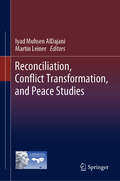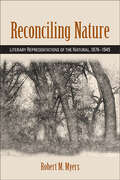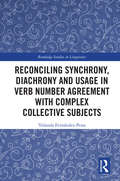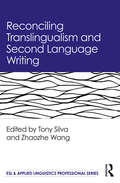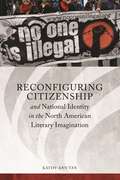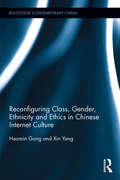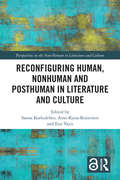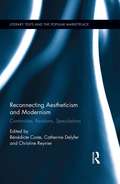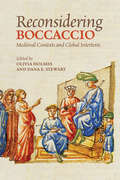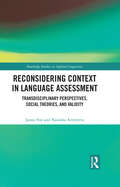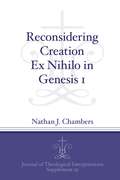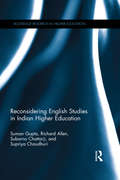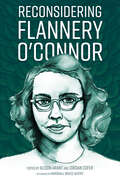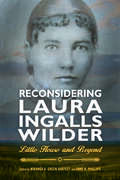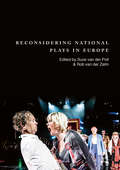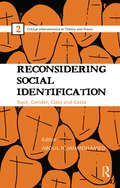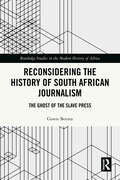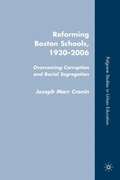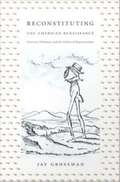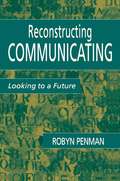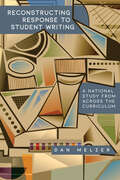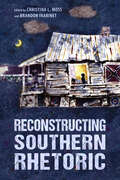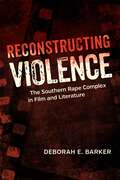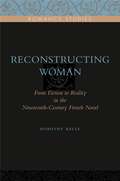- Table View
- List View
Reconciliation, Conflict Transformation, and Peace Studies
by Martin Leiner Iyad Muhsen AlDajaniThis book, achieved in cooperation with the Academic Alliance for Reconciliation Studies in the Middle East and North Africa (AARMENA), focuses on peacebuilding, conflict transformation, and shifts toward approaching the reconciliation process as an inter-, trans- and multidisciplinary field. The research presented in the series focuses on the Middle East and North Africa, highlighting contributions by practitioners and scholars alike.The book is divided into five sections:Sections 1: Theoretical and Philosophical FrameworkSection 2: Digital Humanities on Reconciliation, Conflict Transformation, and Peace StudiesSection 3: Research Science on Reconciliation, Conflict Transformation, and Peace StudiesSection 4: Practices of Studies on Reconciliation, Conflict Transformation, and Peace StudiesSection 5: Cases Studies on Reconciliation, Conflict Transformation, and Peace StudiesThe book's first part focuses on theories and the philosophical framework for the research on reconciliation, conflict transformation, and peace studies. The second part of the book is dedicated to digital humanities development in the reconciliation and peace education field, its impact on the reconciliation process in societies, and the introduction of Artificial Intelligence in analysis techniques to differentiate and identify research in different domains. The book's third part is dedicated to the research on reconciliation and conflict transformation in different disciplines. The fourth part concentrates on the practices in the field, and the fifth part illustrates case studies on reconciliation, conflict transformation, and peace studies. The target audience is professors, scholars, practitioners, students, and scientists that are experts in the field of Middle East and North Africa.
Reconciling Nature: Literary Representations of the Natural, 1876-1945
by Robert M. MyersReconciling Nature maps the complex views of the environment that are evident in celebrated American novels written between the Centennial Celebration of 1876 and the end of the Second World War. During this period, which includes the Progressive era and the New Deal, Americans held three contradictory views of the natural world: a recognition of nature's vulnerability to the changes brought by industrialism; a fear of the power of nature to destroy human civilization; and a desire to make nature useful. Robert M. Myers argues they reconciled these conflicting views through nature nostalgia, policing of wilderness areas, and through strategies of control borrowed from the social sciences. Myers combines environmental history with original readings of eight novels, producing fresh perspectives on Mark Twain's Adventures of Huckleberry Finn, Stephen Crane's Maggie, Kate Chopin's The Awakening, Upton Sinclair's The Jungle, Mary Austin's The Ford, Theodore Dreiser's An American Tragedy, Zora Neale Hurston's Their Eyes Were Watching God, and William Faulkner's Go Down, Moses. While previous ecocritical works have focused on proto-environmentalism in classic works of literature, Reconciling Nature explores the ambivalence within these texts, demonstrating how they reproduce views of nature as threatened, threatening, and useful. The epilogue examines the environmental ideologies associated with the development and deployment of the first atomic bomb.
Reconciling Synchrony, Diachrony and Usage in Verb Number Agreement with Complex Collective Subjects (Routledge Studies in Linguistics)
by Yolanda Fernández-PenaThis book uses corpus-based methodologies to investigate the wide variety of factors behind verb number agreement with complex collective noun phrases in English. The literature on collective nouns and their agreement patterns spans an array of disciplines and approaches. However, little of the research conducted to date has focused on the influence of of-dependents on verb number with relational collective nouns, as in examples such as a bunch of or a group of. Drawing on data from two case studies – one based on the Corpus of Historical American English (COHA), and the other on the British National Corpus (BNC) and the Corpus of Contemporary American English (COCA) – Fernández-Pena uses statistical modelling to unpack the different morphological, syntactic, semantic and lexical dimensions of the variables affecting verb number agreement with complex collective noun phrases in English. This multidimensional analysis of the significance of of-dependents in the patterning and contemporary usage of collective nouns offers new insight into and understanding of both synchronic variation and diachronic change. This book is an essential read for scholars of English language variation and change, historical linguistics, corpus linguistics, and usage-based approaches to the study of language.
Reconciling Translingualism and Second Language Writing (ESL & Applied Linguistics Professional Series)
by Tony Silva; Zhaozhe WangThis book brings together top scholars on different sides of the important scholarly debate between the translingual movement and the field of second language writing. Drawing on a wide range of perspectives, this volume examines the differences in theory and practice with the hope of promoting reconciliation between the two schools of thought. Chapters address the tensions in the relationship between translingualism and second language writing and explore programs, pedagogies, and research that highlight commonalities between the two camps. With contributions from leading scholars, this book comprehensively addresses the issues related to this contentious debate and offers ways to bring the two camps into conversation with one another in a way that promotes effective teaching practices. By providing a panoramic view of the current situation, the text is a timely and unique contribution to TESOL, applied linguistics, and composition studies.
Reconfiguring Citizenship and National Identity in the North American Literary Imagination (Series in Citizenship Studies)
by Kathy-Ann TanLiterature has always played a central role in creating and disseminating culturally specific notions of citizenship, nationhood, and belonging. In Reconfiguring Citizenship and National Identity in the North American Literary Imagination, author Kathy-Ann Tan investigates metaphors, configurations, parameters, and articulations of U.S. and Canadian citizenship that are enacted, renegotiated, and revised in modern literary texts, particularly during periods of emergence and crisis. Tan brings together for the first time a selection of canonical and lesser-known U.S. and Canadian writings for critical consideration. She begins by exploring literary depiction of "willful" or "wayward" citizens and those with precarious bodies that are viewed as threatening, undesirable, unacceptable--including refugees and asylum seekers, undocumented migrants, deportees, and stateless people. She also considers the rights to citizenship and political membership claimed by queer bodies and an examination of "new" and alternative forms of citizenship, such as denizenship, urban citizenship, diasporic citizenship, and Indigenous citizenship. With case studies based on works by a diverse collection of authors--including Nathaniel Hawthorne, Djuna Barnes, Etel Adnan, Sarah Schulman, Walt Whitman, Gail Scott, and Philip Roth--Tan uncovers alternative forms of collectivity, community, and nation across a broad range of perspectives. In line with recent cross-disciplinary explorations in the field, Reconfiguring Citizenship and National Identity in the North American Literary Imagination shows citizenship as less of a fixed or static legal entity and more as a set of symbolic and cultural practices. Scholars of literary studies, cultural studies, and citizenship studies will be grateful for Tan's illuminating study.
Reconfiguring Class, Gender, Ethnicity and Ethics in Chinese Internet Culture: Caught on the Web (Routledge Contemporary China Series)
by Haomin Gong Xin YangNew information technologies have, to an unprecedented degree, come to reshape human relations, identities and communities both online and offline. As Internet narratives including online fiction, poetry and films reflect and represent ambivalent politics in China, the Chinese state wishes to enable the formidable soft power of this new medium whilst at the same time handling the ideological uncertainties it inevitably entails. This book investigates the ways in which class, gender, ethnicity and ethics are reconfigured, complicated and enriched by the closely intertwined online and offline realities in China. It combs through a wide range of theories on Internet culture, intellectual history, and literary, film, and cultural studies, and explores a variety of online cultural materials, including digitized spoofing, microblog fictions, micro-films, online fictions, web dramas, photographs, flash mobs, popular literature and films. These materials have played an important role in shaping the contemporary cultural scene, but have so far received little critical attention. Here, the authors demonstrate how Chinese Internet culture has provided a means to intervene in the otherwise monolithic narratives of identity and community. Offering an important contribution to the rapidly growing field of Internet studies, this book will also be of interest to students and scholars of Chinese culture, literary and film studies, media and communication studies, and Chinese society.
Reconfiguring Human, Nonhuman and Posthuman in Literature and Culture (Perspectives on the Non-Human in Literature and Culture)
by Sanna Karkulehto Aino-Kaisa Koistinen Essi VarisThe time has come for human cultures to seriously think, to severely conceptualize, and to earnestly fabulate about all the nonhuman critters we share our world with, and to consider how to strive for more ethical cohabitation. Reconfiguring Human, Nonhuman and Posthuman in Literature and Culture tackles this severe matter within the framework of literary and cultural studies. The emphasis of the inquiry is on the various ways actual and fictional nonhumans are reconfigured in contemporary culture – although, as long as the domain of nonhumanity is carved in the negative space of humanity, addressing these issues will inevitably clamor for the reconfiguration of the human as well.
Reconnecting Aestheticism and Modernism: Continuities, Revisions, Speculations (Literary Texts and the Popular Marketplace)
by Christine Reynier Bénédicte Coste Catherine DelyferCharting the period that extends from the 1860s to the 1940s, this volume offers fresh perspectives on Aestheticism and Modernism. By acknowledging that both movements had a passion for the ‘new’, it goes beyond the alleged divide between Modernism and its predecessors. Rather than reading the modernist credo, ‘Make it New!’, as a desire to break away from the past, the authors of this book suggest reading it as a continuation and a reappropriation of the spirit of the ‘New’ that characterizes Aestheticism. Basing their arguments on recent reassessments of Aestheticism and Modernism and their articulation, contributors take up the challenge of interrogating the connections, continuities, and intersections between the two movements, thus revealing the working processes of cultural and aesthetic change so as to reassess the value of the new for each. Attending to well-known writers such as Waugh, Woolf, Richardson, Eliot, Pound, Ford, Symons, Wilde, and Hopkins, as well as to hitherto neglected figures such as Lucas Malet, L.S. Gibbon, Leonard Woolf, or George Egerton, they revise assumptions about Aestheticism and Modernism and their very definitions. This collection brings together international scholars specializing in Aestheticism or Modernism who push their analyses beyond their strict period of expertise and take both movements into account through exciting approaches that borrow from aesthetics, philosophy, or economics. The volume proposes a corrective to the traditional narratives of the history of Aestheticism and Modernism, revitalizing definitions of these movements and revealing new directions in aestheticist and modernist studies.
Reconsidering Boccaccio: Medieval Contexts and Global Intertexts (Toronto Italian Studies)
by Olivia Holmes Dana StewartReconsidering Boccaccio highlights the great Florentine writer Giovanni Boccaccio’s remarkable achievements in the fourteenth century as a cultural mediator, his exceptional social, geographic, and intellectual range, and the influence of his legacy on numerous cultural networks. Grounded in Boccaccio’s own writings, Reconsidering Boccaccio brings a variety of methodologies and critical approaches to the works of one of the ‘three crowns’ of Italian literature. Containing essays by scholars not only of Italian literature, but also history, law, classics, and Middle Eastern literature, this collection is part of a vital movement to open up a dialogue among researchers in various areas of study that touch on the works of Boccaccio. The volume highlights the necessity of a technical and historical framework when approaching Boccaccio studies, while also shedding new light on the lives of women and their role in the reception of Boccaccio’s works.
Reconsidering Context in Language Assessment: Transdisciplinary Perspectives, Social Theories, and Validity (Routledge Studies in Applied Linguistics)
by Janna Fox Natasha ArtemevaThis volume reconsiders the problem of context in language testing and other modes of assessment from the perspective of transdisciplinarity. Transdisciplinary assessment research brings together collaborators who draw on the strengths of their differing backgrounds and expertise in order to address high-stakes complex socially-relevant problems. Traditional treatments of context in language assessment research have generally been informed by individualist cognitive theories within measurement and psychometrics. The additive potential of alternative social theories, including theories of genre, situated learning, distributed cognition, and intercultural communication, has largely been overlooked. In this book, the benefits of socio-theoretical reconsiderations of context are discussed and further exemplified in transdisciplinary research studies that investigate the use of assessment in classroom and workplace settings. The book offers a renewed view of context in arguments for the validity of assessment practices, and will be of interest to assessment researchers, practitioners, and students in applied linguistics, education, educational psychology, language testing, and other related disciplines and fields.
Reconsidering Creation Ex Nihilo in Genesis 1 (Journal of Theological Interpretation Supplements #19)
by Nathan J. ChambersThere is a broad consensus among biblical scholars that creation ex nihilo (from nothing) is a late Hellenistic concept with little inherent connection to Genesis 1 and other biblical creation texts. In this book, Nathan J. Chambers forces us to reconsider the question, arguing in favor of reading this chapter of the Bible in terms of ex nihilo creation and demonstrating that there is a sound basis for the early Christian development of the doctrine.Drawing on the theology of Augustine of Hippo and Thomas Aquinas, Chambers considers what the ex nihilo doctrine means and does in classical Christian dogma. He examines ancient Near Eastern cosmological texts that provide a potential context for reading Genesis 1. Recognizing the distance between the possible historical and theological frameworks for interpreting the text, he illuminates how this doctrine developed within early Christian thought as a consequence of the church’s commitment to reading Genesis 1 as part of Christian Scripture. Through original close readings of the chapter that engage critically with the work of Jon Levenson, Hermann Gunkel, and Brevard Childs, Chambers demonstrates that, far from precluding interpretive possibilities, reading Genesis 1 in terms of creation from nothing opens up a variety of interpretive avenues that have largely been overlooked in contemporary biblical scholarship.Timely and innovative, this book makes the case for a new (or recovered) framework for reading Genesis 1 that will appeal to biblical studies scholars and seminarians.
Reconsidering English Studies in Indian Higher Education (Routledge Research in Higher Education)
by Richard Allen Suman Gupta Supriya Chaudhuri Subarno ChattarjiThis book examines the status of English Studies in India, aspirations pinned on the subject by students, teachers, policy-makers and society in general, and how these are addressed at the higher education level. It presents analytical background discussions of the history and policy environment, and offers open-ended, multi-faceted and multi-vocal accounts of particular aspects of contemporary Indian English Studies, including curriculum, pedagogy, research, employment, relation to Indian vernaculars and translation studies. Reconsidering English Studies in Indian Higher Education is an invaluable source for anyone interested in: The relevant histories and higher education policies Professional concerns, including employment, management, teaching and scholarly practices, and negotiations in terms of socio-cultural life Student attitudes, experiences and aspirations Management ethos and academic work in a comparative perspective, informed by the situation and debates in the United Kingdom and United States of America The context of global English Studies and globalization The book will be of primary interest to academic readers such as students, teachers and researchers in English Studies in India, Britain and wherever the discipline is pursued at higher education level Suman Gupta is Professor and Chair in Literature and Cultural History at The Open University. Richard Allen is Professor Emeritus at the Department of English at The Open University. Subarno Chattarji is Associate Professor at the Department of English, University of Delhi. Supriya Chaudhuri is Professor Emeritus at the Department of English, Jadavpur University, Kolkata.
Reconsidering Flannery O'Connor
by Marshall Bruce GentryContributions by Lindsay Alexander, Alison Arant, Alicia Matheny Beeson, Eric Bennett, Gina Caison, Jordan Cofer, Doug Davis, Doreen Fowler, Marshall Bruce Gentry, Bruce Henderson, Monica C. Miller, William Murray, Carol Shloss, Alison Staudinger, and Rachel Watson The National Endowment for the Humanities has funded two Summer Institutes titled "Reconsidering Flannery O’Connor," which invited scholars to rethink approaches to Flannery O’Connor’s work. Drawing largely on research that started as part of the 2014 NEH Institute, this collection shares its title and its mission. Featuring fourteen new essays, Reconsidering Flannery O’Connor disrupts a few commonplace assumptions of O’Connor studies while also circling back to some old questions that are due for new attention. The volume opens with “New Methodologies,” which features theoretical approaches not typically associated with O’Connor’s fiction in order to gain new insights into her work. The second section, “New Contexts,” stretches expectations on literary genre, on popular archetypes in her stories, and on how we should interpret her work. The third section, lovingly called “Strange Bedfellows,” puts O’Connor in dialogue with overlooked or neglected conversation partners, while the final section, “O’Connor’s Legacy,” reconsiders her personal views on creative writing and her wishes regarding the handling of her estate upon death. With these final essays, the collection comes full circle, attesting to the hazards that come from overly relying on O’Connor’s interpretation of her own work but also from ignoring her views and desires. Through these reconsiderations, some of which draw on previously unpublished archival material, the collection attests to and promotes the vitality of scholarship on Flannery O’Connor.
Reconsidering Laura Ingalls Wilder: Little House and Beyond (Children's Literature Association Series)
by Miranda A. Green-Barteet and Anne K. PhillipsContributions by Emily Anderson, Elif S. Armbruster, Jenna Brack, Christine Cooper-Rompato, Christiane E. Farnan, Melanie J. Fishbane, Vera R. Foley, Sonya Sawyer Fritz, Miranda A. Green-Barteet, Anna Thompson Hajdik, Keri Holt, Shosuke Kinugawa, Margaret Noodin, Anne K. Phillips, Dawn Sardella-Ayres, Katharine Slater, Lindsay Stephens, and Jericho WilliamsReconsidering Laura Ingalls Wilder: Little House and Beyond offers a sustained, critical examination of Wilder's writings, including her Little House series, her posthumously published and unrevised The First Four Years, her letters, her journalism, and her autobiography, Pioneer Girl. The collection also draws on biographies of Wilder, letters to and from Wilder and her daughter, collaborator and editor Rose Wilder Lane, and other biographical materials. Contributors analyze the current state of Wilder studies, delineating Wilder's place in a canon of increasingly diverse US women writers, and attending in particular to issues of gender, femininity, space and place, truth, and collaboration, among other issues.The collection argues that Wilder's work and her contributions to US children's literature, western literature, and the pioneer experience must be considered in context with problematic racialized representations of peoples of color, specifically Native Americans. While Wilder's fiction accurately represents the experiences of white settlers, it also privileges their experiences and validates, explicitly and implicitly, the erasure of Native American peoples and culture. The volume’s contributors engage critically with Wilder's writings, interrogating them, acknowledging their limitations, and enhancing ongoing conversations about them while placing them in context with other voices, works, and perspectives that can bring into focus larger truths about North American history. Reconsidering Laura Ingalls Wilder examines Wilder's strengths and weaknesses as it discusses her writings with context, awareness, and nuance.
Reconsidering National Plays in Europe
by Suze Poll Rob ZalmThis volume frames the concept of a national play. By analysing a number of European case studies, it addresses the following question: Which play could be regarded as a country's national play, and how does it represent its national identity? The chapters provide an in-depth look at plays in eight different countries: Germany (Die Räuber, Friedrich Schiller), Switzerland (Wilhelm Tell, Friedrich Schiller), Hungary (Bánk Bán, József Katona), Sweden (Gustav Vasa, August Strindberg), Norway (Peer Gynt, Henrik Ibsen), the Netherlands (The Good Hope, Herman Heijermans), France (Tartuffe, Molière), and Ireland. This collection is especially relevant at a time of socio-political flux, when national identity and the future of the nation state is being reconsidered.
Reconsidering Social Identification: Race, Gender, Class and Caste (Critical Interventions In Theory And Praxis Ser.)
by Abdul R. JanMohamedThis volume investigates how four socially constructed identities (race, gender, class and caste) can be rethought as matrices designed to accumulate various kinds of socio-economic values and to translate and transfer these values from one group to another. Essays in the anthology also attempt to compare the mechanisms deployed by various groups to consolidate identificatory investments. Drawn mainly for the fields of literary and cultural studies, the essays are grouped in four categories. Essays collected under ‘Theoretical Approaches’ scrutinize the relative value of various approaches; those collected under ‘Considerations of Race, Gender, and Sexual Orientation’ examine the interaction between these three categories in formation of identities; those grouped under ‘Comparative Analysis of African-American and Dalit Writing’ provide comparative analyses of the literary productions of these two oppressed groups; and, finally, those under ‘The Persistence of Racialized Perceptions’ focus on the role of ideologically inflected perception of European colonizers and the persistence of such perception in the categorization and treatment of colonial migrants to the metropolis.
Reconsidering the History of South African Journalism: The Ghost of the Slave Press (Routledge Studies in the Modern History of Africa)
by Gawie BotmaThe concept of the “free press” is often celebrated as the vehicle which finally brought freedom of speech and democracy to post-apartheid South Africa, but historically, the position of the press was more complicated.This book dives into the history of slavery at the Cape between 1800 and 1838, reflecting on the fact that several founding journalists and printers were slave owners themselves and advertised slaves as regular “property” in their publications. The book presents an inclusive history of the founding of colonial newspapers and magazines, driven by the question of how we in the 21st century should make sense of the role that newspapers and journalism played at key points in the history of slavery and its aftermath. The “slave press” was a label originally attached to The Cape Town Gazette and African Advertiser when it was founded by a pair of well-connected private British slave traders.This book challenges us to confront the ghost of the slave press, and to consider the complicated history of press freedom in South Africa. This important book will be of interest to scholars and students of journalism and media history, in South Africa and beyond.
Reconstituting Americans
by Megan ObournBoston's schools in 2006 won the Eli Broad Prize for the Most Improved Urban School System in America. But from the 1930s into the 1970s the city schools succumbed to scandals including the sale of jobs and racial segregation. This book describes the black voices before and after court decisions and the struggles of Boston teachers before and after collective bargaining. The contributions of universities, corporations and political leaders to restore academic achievement are evaluated by one who observed Boston schools for forty years.
Reconstituting the American Renaissance: Emerson, Whitman, and the Politics of Representation
by Jay GrossmanChallenging the standard periodization of American literary history, Reconstituting the American Renaissance reinterprets the works of Ralph Waldo Emerson and Walt Whitman and the relationship of these two authors to each other. Jay Grossman argues that issues of political representation--involving vexed questions of who shall speak and for whom--lie at the heart of American political and literary discourse from the revolutionary era through the Civil War. By taking the mid-nineteenth-century period, traditionally understood as marking the advent of literary writing in the United States, and restoring to it the ways in which Emerson and Whitman engaged with eighteenth-century controversies, rhetorics, and languages about political representation, Grossman departs significantly from arguments that have traditionally separated American writing in the eighteenth and nineteenth centuries. Reconstituting the American Renaissance describes how Emerson and Whitman came into the period of their greatest productivity with different conceptions of the functions and political efficacy of the word in the world. It challenges Emerson's position as Whitman's necessary precursor and offers a cultural history that emphasizes the two writers' differences in social class, cultural experience, and political perspective. In their writings between 1830 and 1855, the book finds contrasting conceptions of the relations between the "representative man" and the constituencies to whom, and for whom, he speaks. Reconstituting the American Renaissance opens up the canonical relationship between Emerson and Whitman and multiplies the historical and discursive contexts for understanding their published and unpublished works.
Reconstructing American Literary History: Harvard English Studies 13
by Sacvan BercovitchSelected essays based on new interpretations.
Reconstructing Communicating: Looking To A Future (Routledge Communication Series)
by Robyn PenmanIn this innovative and potentially controversial book, Penman examines the future of communication as a discipline. She foresees a time in which communicating is conceived as a social construction process, in the anticipation that this will allow a genuine practical response to contemporary social problems. The book sets out a map toward accomplishing that future--laying the foundations for a different way of conceiving of communication, enabling direct action, rather than just theorizing about it. It begins with a history illustrating how the communication discipline has arrived to where it is today and then goes on to demonstrate Penman's conception of communication. Reconstructing Communicating is an exploration of what it means to inquire into communicating; to treat communicating as the essential problematic of concern; and to recognize that we construct our reality in our communicating. In undertaking this exploration, the author pursues a central theme of what constitutes good communicating and good communication research. Arguments throughout this book provide a radical departure from mainstream communication studies and especially from the rationalist's quest for truth and scientific knowledge. A way of acting in good faith is offered, both with the process of communicating and with the participants in it, that generates practical understandings for constructing new futures. Designed for communication scholars and graduate students primarily in organizational communication, public relations, and communication theory, this book will also interest those in management and business as it deals with practical communication issues.
Reconstructing Response to Student Writing: A National Study from across the Curriculum
by Dan MelzerIn Reconstructing Response to Student Writing Dan Melzer makes the argument that writing instructors should shift the construct so that peer response and student self-assessment are more central than teacher response. Presenting the results of a national study of teacher and peer response and student self-assessment at institutions of higher education across the United States, Melzer analyzes teacher and peer response to over 1,000 pieces of student writing as well as 128 student portfolio reflection essays. He draws on his analysis and on a comprehensive review of the literature on response to introduce a constructivist heuristic for response aimed at both composition instructors and instructors across disciplines. Melzer argues that teachers and researchers should focus less on teacher response to individual pieces of student writing and more on engaging in dialogue with student self-assessment and peer response, focusing on growth and transfer rather than products and grades. Reconstructing Response to Student Writing, especially when taken together with Melzer’s previous book Assignments across the Curriculum, provides a comprehensive and large-scale view of college writing and responding across the curriculum in the United States.
Reconstructing Southern Rhetoric (Race, Rhetoric, and Media Series)
by Christina L. Moss and Brandon InabinetContributions by Whitney Jordan Adams, Wendy Atkins-Sayre, Jason Edward Black, Patricia G. Davis, Cassidy D. Ellis, Megan Fitzmaurice, Michael L. Forst, Jeremy R. Grossman, Cynthia P. King, Julia M. Medhurst, Ryan Neville-Shepard, Jonathan M. Smith, Ashli Quesinberry Stokes, Dave Tell, and Carolyn WalcottSouthern rhetoric is communication’s oldest regional study. During its initial invention, the discipline was founded to justify the study of rhetoric in a field of white male scholars analyzing significant speeches by other white men, yielding research that added to myths of Lost Cause ideology and a uniquely oratorical culture. Reconstructing Southern Rhetoric takes on the much-overdue task of reconstructing the way southern rhetoric has been viewed and critiqued within the communication discipline. The collection reveals that southern rhetoric is fluid and migrates beyond geography, is constructed in weak counterpublic formation against legitimated power, creates a region that is not monolithic, and warrants activism and healing.Contributors to the volume examine such topics as political campaign strategies, memorial and museum experiences, television and music influences, commemoration protests, and ethnographic experiences in the South. The essays cohesively illustrate southern identity as manifested in various contexts and ways, considering what it means to be a part of a region riddled with slavery, Jim Crow laws, and other expressions of racial and cultural hierarchy. Ultimately, the volume initiates a new conversation, asking what southern rhetorical critique would be like if it included the richness of the southern culture from which it came.
Reconstructing Violence: The Southern Rape Complex in Film and Literature (Southern Literary Studies)
by Deborah E. BarkerIn this bold study of cinematic depictions of violence in the south, Deborah E. Barker explores the ongoing legacy of the "southern rape complex" in American film. Taking as her starting point D. W. Griffith's infamous Birth of a Nation, Barker demonstrates how the tropes and imagery of the southern rape complex continue to assert themselves across a multitude of genres, time periods, and stylistic modes. Drawing from Gilles Deleuze's work on cinema, Barker examines plot, dialogue, and camera technique as she considers several films: The Story of Temple Drake (1933), Sanctuary (1958), Touch of Evil (1958), To Kill a Mockingbird (1962), and Cape Fear (1962). Placing this body of analysis in the context of the historical periods when these films appeared and the literary sources on which they are based, Barker reveals the protean power of cinematic racialized violence amid the shifting cultural and political landscapes of the South and the nation as a whole. By focusing on familiar literary and cinematic texts--each produced or set during moments of national crisis such as the Great Depression or the civil rights movement--Barker's Reconstructing Violence offers fresh insights into the anxiety that has underpinned sexual and racial violence in cinematic representations of the South.
Reconstructing Woman: From Fiction to Reality in the Nineteenth-Century French Novel (Penn State Romance Studies #4)
by Dorothy KellyReconstructing Woman explores a scenario common to the works of four major French novelists of the nineteenth century: Balzac, Flaubert, Zola, and Villiers. In the texts of each author, a “new Pygmalion” (as Balzac calls one of his characters) turns away from a real woman he has loved or desired and prefers instead his artificial re-creation of her. All four authors also portray the possibility that this simulacrum, which replaces the woman, could become real. The central chapters examine this plot and its meanings in multiple texts of each author (with the exception of the chapter on Villiers, in which only “L’Eve future” is considered).The premise is that this shared scenario stems from the discovery in the nineteenth century that humans are transformable. Because scientific innovations play a major part in this discovery, Dorothy Kelly reviews some of the contributing trends that attracted one or more of the authors: mesmerism, dissection, transformism, and evolution, new understandings of human reproduction, spontaneous generation, puericulture, the experimental method. These ideas and practices provided the novelists with a scientific context in which controlling, changing, and creating human bodies became imaginable.At the same time, these authors explore the ways in which not only bodies but also identity can be made. In close readings, Kelly shows how these narratives reveal that linguistic and coded social structures shape human identity. Furthermore, through the representation of the power of language to do that shaping, the authors envision that their own texts would perform that function. The symbol of the reconstruction of woman thus embodies the fantasy and desire that their novels could create or transform both reality and their readers in quite literal ways. Through literary analyses, we can deduce from the texts just why this artificial creation is a woman.
